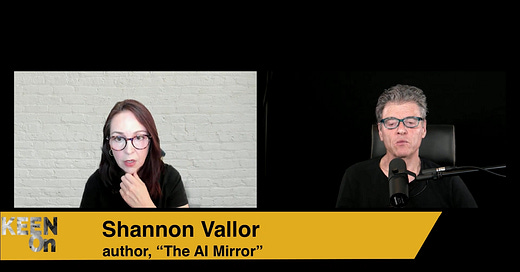According to Shannon Vallor, a self-styled AI “ethicist”, artificial intelligence is a mirror. When we interact with the latest algorithms from OpenAI or Anthropic, she says, we are actually observing our social and political values, prejudices and ideals. This all-too-human quality of AI makes it less of an existential threat to humanity and more of a reflection both of society’s flaws and a promise of its self-improvement. AI, like our own reflection in the mirror, is both everything and nothing. No wonder we need “ethicists” like Vallor to remind us of our flawed appearance.
Shannon Vallor is a philosopher of AI and a writer of books about how new technologies reshape human character. Vallor grew up fascinated by the promise of computing, robotics, and space travel to allow us to shape a more humane future. Today that dream is drifting further away, as we lock ourselves into ever more unsustainable social and environmental patterns. Despite being marketed as the keys to our future, the AI technologies that dominate the headlines today only tend to amplify and reinforce those patterns. Can AI help us unweave them instead? Can we use it to strengthen the virtues of human wisdom, care, and creativity, rather than to devalue and replace them? Vallor’s work seeks to reclaim technology's roots as a moral practice: finding new and better techniques for the care and service of life with others, and the humane engineering of futures worth wanting.
Named as one of the "100 most connected men" by GQ magazine, Andrew Keen is amongst the world's best known broadcasters and commentators. In addition to presenting KEEN ON, he is the host of the long-running How To Fix Democracy show. He is also the author of four prescient books about digital technology: CULT OF THE AMATEUR, DIGITAL VERTIGO, THE INTERNET IS NOT THE ANSWER and HOW TO FIX THE FUTURE. Andrew lives in San Francisco, is married to Cassandra Knight, Google's VP of Litigation & Discovery, and has two grown children.













Share this post